Books read in 2024
August 12, 2025
Another round of book reviews, arriving fashionably late, but earlier than last year. While compiling the list I realized last year I’d missed two books I began in 2022 and finished in 2023. I’ve included them here, together with the books from 2024.
The through-lines this time around were people vs. systems; how media and technology mediate our lives and reorganize identity; the ethics of knowledge and progress; and the pull between belonging and otherness. I didn’t notice it myself, but Hannah pointed out as soon as she read my first draft that Judaism was another key theme. In the words of DFW, what the hell is water?
Triumph of the City - Edward Glaeser
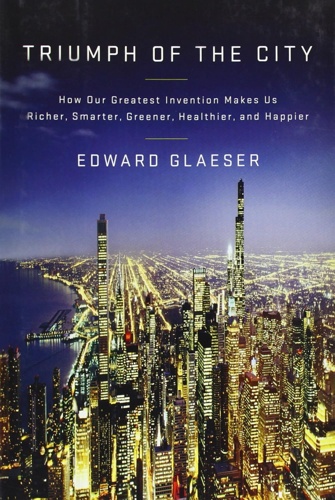
In Triumph of the City, economist Edward Glaeser argues that cities are humanity’s greatest invention. Through examples from ancient Athens to the rise of modern Manhattan and Chicago, he explains how cities bring people together to share ideas and learn from each other, creating positive externalities that outweigh the negatives usually associated with urban living. Glaeser pushes the reader to “discard the view that environmentalism means living around trees and that urbanites should always fight to preserve a city’s physical past.” He wants us to consider that urban poverty is a positive, pointing out that the poor live in cities not because urban centers create poverty but because they offer opportunities that attract the impoverished.
The book is sharpest when discussing local policies, like zoning and environmental guidelines in coastal cities, and their bad global outcomes. Glaeser skewers places like San Francisco and Berkeley, where restrictive zoning keeps housing scarce, drives up prices, and pushes people to car and A/C-dependent suburbs. These well-intentioned moves lead to more sprawl, more emissions, and fewer people living where there is mild weather and there are jobs. The ensuing sprawl leads to an overall worse outcome for the planet, and a supposed win for locals’ outdated ideas of environmentalism which end up hurting the rest of us.
He argues that we should focus on helping poor people move to cities, rather than propping up declining places with subsidized government programs or new infrastructure projects. He reminds us that cities aren’t just collections of buildings - they’re networks of people and opportunities. His approach is practical, offering important lessons for making cities more affordable and livable for everyone.
My Brilliant Friend - Elena Ferrante (translated by Ann Goldstein)
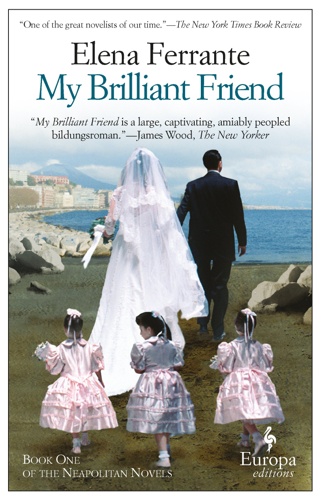
I watched the HBO adaptation of My Brilliant Friend before reading the book. Hannah made me. It’s her favorite book series, and another one we read together (her second time through). It’s hard for me to disambiguate the first book from the full story, having seen the whole thing. To make things worse, this one should have been on my 2023 list, but it got lost in the shuffle. The show is great, but the book is better.
My Brilliant Friend tells the story of social progress in mid-century Italy through the eyes of two young girls, following their friendship through the years. While Lenú is clearly the protagonist, the book only works because of the dichotomy with her friend Lila. The writing is great, and multifaceted. What grabbed me wasn’t the drama itself but the weight of time and place. Their neighborhood in Naples isn’t scenery; it’s a trap. Progress means a shot at escape, but escaping means leaving something behind. To me, a relatable story.
When the New York Times named it the best book of the century, Hannah looked at me and said, “Is this what people feel when their team wins the Super Bowl?”
Lords of Finance - Liaquat Ahamed
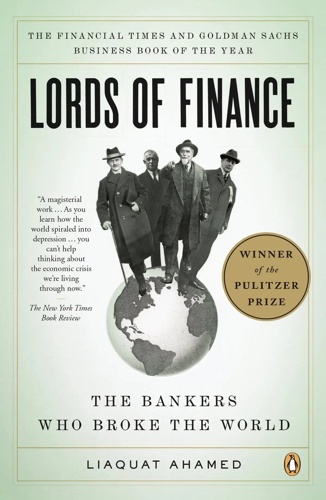
Lords of Finance is not just a history of modern finance but a spotlight on the power of individual agency within a globalized economy. Ahamed illustrates how human relationships intertwined with the crises of the early 20th-century, shaping economic policy with long-lasting repercussions.
It covers the interwar period through the eyes of four central bankers: Montagu Norman of the Bank of England, Émile Moreau of the Banque de France, Benjamin Strong of the Federal Reserve Bank of New York, and Hjalmar Schacht of the Reichsbank. Norman’s British stoicism, Moreau’s defensive patriotism, Strong’s proactive spirit, and Schacht’s discontent with the struggling Weimar Republic reveal as much about their nations as about the men themselves. These guys weren’t the cartoon villains that come to mind when you think of bankers—they were well-intentioned, mostly competent men in funny hats. I was particularly struck by how contingent the course of history was on their relationships, friendships that both constructed and constrained the era’s financial landscapes and shaped the world that we live in.
Ahamed doesn’t just recount history; he shows how the flux of personal influence and economic theory spiraled into the Great Depression and the specter of war while speculating on how events might have played out if these guys felt differently about each other during specific moments. He frames his narrative as a cautionary tale of leadership where the personal is indeed political. No grand system failure. No inevitable decline. Just a handful of people improvising through crises, assuming they had control—and finding out they didn’t. You don’t need conspiracies when hubris and inertia do the job. Hanlon is calling.
Wittgenstein's Mistress - David Markson
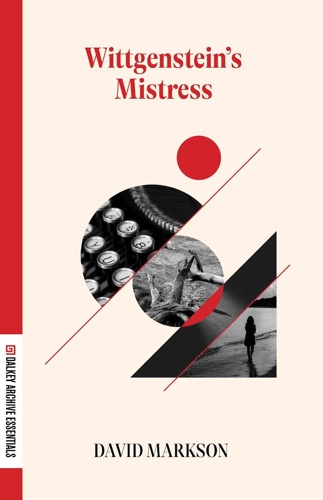
I picked up Wittgenstein’s Mistress at Golden Hour Books while we were visiting Hannah’s family in Indianapolis. I told the owner a bit about my taste, and she pushed me to try Markson, who I had never heard of. I had read bits of Wittgenstein for a MOOC, but I was not familiar enough with his work to appreciate many of the references in this book.
The novel is a one-woman monologue, a confusing jumble of consciousness from an unreliable narrator trying to figure out what is happening as she tells us about her life. It’s told in short, looping fragments that feel like someone typing through insomnia. She name-drops authors and painters not to impress us, but because it’s all she has left. Culture becomes memory. Memory becomes fiction. Fiction becomes survival. Historical figures, art, and mundane anecdotes of her past blend into surreal scenes through recurring references. As the main character realizes (or convinces herself) that she’s the last person alive on Earth, you’re left wondering what is real and what is imagined, laughing at the absurdity of her chains of thought.
I probably would not have gotten as much out of it if I hadn’t read Homer and stopped to read every plaque in more than one European art museum, but it’s a fun exploration of memory and language. In the end that’s how all our memories work - pinning our life with borrowed references that might mean something to others when they hear our stories.
Un Verdor Terrible - Benjamin Labatut
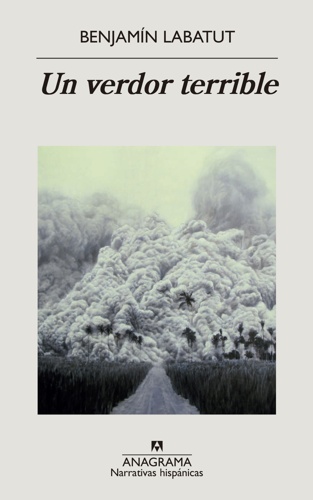
Back in high school I was obsessed with physics and the people who made its great discoveries. Labatut’s Un Verdor Terrible (in English, When We Cease to Understand the World) is a fictionalized account of some of those great scientists’ lives, exploring the tension between the progress and horrors tied to the pursuit of scientific knowledge.
These people undoubtedly pushed humanity forward, but the same chemical process that gave us nitrogen to feed the world also gave us Zyklon B. The same equations that led to modern physics also gave us Hiroshima. The line is blurry, but the portraits that Labatut paints feel haunting, less as a tragedy and more a terrible kind of symmetry. These people’s inner conflicts and their loneliness are palpable, and it’s hard to imagine them otherwise. Heisenberg crawling around, chasing quantum butterflies, surrounded by shadows. Grothendieck vanishing into the forest, devoured by his own abstractions.
If you enjoyed the way the movie Oppenheimer wrestled with these themes, but wished it was less literal, and instead more literary, you’ll enjoy this one.
Permutation City - Greg Egan
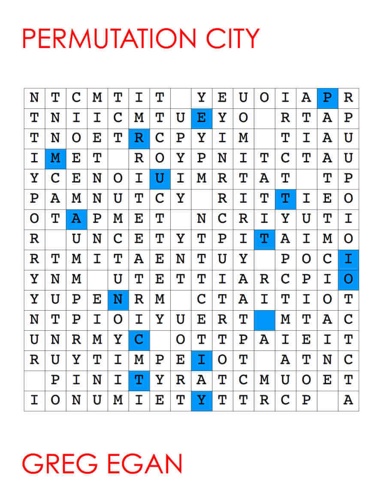
Greg Egan’s Permutation City is an ambitious exploration of consciousness and identity. Set in a digitized universe, its human copies, living in virtual realities, challenge the notion of what it means to be human. Looking at my reading history, it’s clear that this is my favorite flavor of sci-fi.
What am I? The data? The process that generates it? The relationships between the numbers? All of the above?
The novel goes deep into existential philosophy and the moral implications of artificial life, with a hint of class warfare. Running human brains in Egan’s cyberspace must be financed by money in the real world, so the wealthier you are, the richer your copy’s experience can be in Permutation City. To enable his narrative arc, Egan speculatively constructs a global marketplace for fractional computing power, the QIPS Exchange, envisioning a future where computational resources are commoditized similar to stock markets. This is not what makes the world-building special, but it is a shockingly prescient idea considering he wrote this in the 1990s, way before AWS EC2 launched in ‘06 and its later success made “the cloud” obvious. The side plot about the Autoverse, an artificial life simulator based on cellular automata starting from atomic first principles is another fun addition, reminding me of my own experiments with CAs a few years ago. Less fun, but still fascinating is Egan’s notion of Slow Clubs, where copies slow their QIPS consumption to socialize with less wealthy copies who can’t afford living at full clock rates. The narrative is rich with scenarios that stretch from personal crises of self-identity to large-scale economic manipulations involving this new computational economy.
Through its characters and their interactions between the virtual and real worlds, the book scrutinizes the blurred line between the two, raising questions about the ethics of immortality and digital existence. Egan’s foresight into the evolution of technology and its societal impact makes Permutation City not only a compelling story but also a reflection on the trajectories of our digital lives. This was a great rec from Noah Smith.
Milton Friedman: The Last Conservative - Jennifer Burns
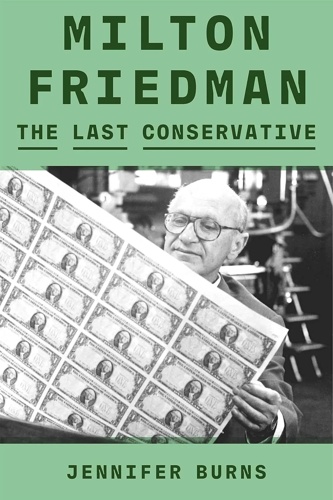
Milton Friedman is synonymous with limited government and the push for free markets that powered twentieth-century conservatism in the US. Burns’ biography chronicles his early life and his rise to prominence at the University of Chicago. It also shows how uncertain his ascent was.
Before Chicago, Friedman was just another ambitious Jewish kid bouncing around the academic margins: Rutgers, Wabash College, Wisconsin, stints at government agencies, etc. No Free to Choose nor Capitalism and Freedom yet. Raised in a religuous household, he wasn’t religious himself, but his Jewish identity defined his belief in the power of markets. To Friedman, regulations restricting trade were often thinly veiled tools to keep Jews and other minorities in their place. He was sure that capitalism had played a role in freeing Jews from systematic discrimination, seeing the same dynamic that Jews from his parents’ generation experienced in Eastern Europe playing out in the US. His dissertation critiqued the use of licensing requirements to exclude refugee Jewish doctors from working in the US, pushing instead for a freer market in medical services. Friedman came to see markets not just as more efficient solutions to planning, but as protective—especially for outsiders like him.
Until reading this book, I didn’t know that Friedman was originally going to study pure math, nor that “economist” wasn’t yet a prestigious title. His time working in government only reinforced his belief that the state was not a neutral arbiter, but a biased actor. In a way, Friedman made a bet that soon the discipline would be seen as more than just a subservient bureaucratic tool. His goal was to set up a meta-game:
Friedman simply did not believe policy-makers could accurately grasp what was happening in the economy, respond in a timely fashion, and correctly anticipate the outcome. Instead, his countervailing vision focused on stable monetary growth as the government’s chief responsibility toward economic life. Beyond that, allocation and exchange should be governed by prices, pulsing through the economy as signals of countless faceless exchanges. Prices couldn’t play favorites. Prices couldn’t be lobbied. Government had to set up basic rules and institutions to let the price system operate, but then it should simply get out of the way.
The Last Conservative covers a lot of ground on a rich life. It takes a close look at the people who shaped him: his wife Rose, his brother-in-law Aaron, and the Frank Knight circle studying Price Theory at Chicago. Later on, it also discusses the people who shaped his ideas—Hayek, Simons, Stigler, and others—and maybe most importantly how the Chicago school of economics came to dominate the discipline and the political landscape in the US. This was a good one.
Dialectic of Enlightenment - Max Horkheimer & Theodor Adorno (translated by Edmund Jephcott)
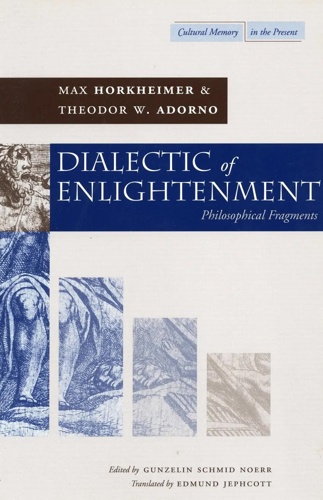
Dialectic of Enlightenment sat on my shelf for almost five years before I tackled the Frankfurt classic through a Catherine Project course last summer. I first encountered fragments of it in Michael Roth’s Modern and Postmodern philosophy class on Coursera. The prose is dense and self-serious, and even in translation it comes off as more interested in sounding important than in being clear, but beneath the fog were sharp ideas about the relationship between reason, power, and culture.
I’m a technocratic software engineer who studied industrial engineering and economics, and I lean towards Austrian ideas to boot, so Horkheimer and Adorno’s Marxist worldview often felt alien and unsubstantiated. They see Enlightenment rationality (embodied in science, markets, and technology) not as engines of human progress, but as systems that subsume the individual into an overarching mechanism of control. What looks like free choice is, for them, merely paths predetermined within a closed structure. I see markets as imperfect but generative, producing prosperity through decentralized, emergent decisions. The structure they critique is not a static monolith, but a complex system shaped by individual agency.
That said, some parts of their cultural analysis land more convincingly than their economic determinism. Their treatment of the particular versus the universal—how industrial society flattens unique human experiences into standardized categories does ring true. Individuals become interchangeable units, with their perceptions and possibilities constrained by the system’s logic. This extends to the “culture industry,” where apparent variety in entertainment and art often masks an underlying sameness. Differences serve classification and control more than genuine diversity. In this view, civilization itself becomes a permanent rite of initiation: to exist within it is to continually adapt oneself to the demands of the whole. What they underplay is that our actions, in turn, reshape the whole.
As Jewish émigrés writing in 1944 at the height of WWII, their discussion of antisemitism carries a personal urgency. They frame Jews as perpetual outsiders and intermediaries in capitalism. Fascism, in their telling, appropriated capitalism, stripping it of moral constraints and treating human beings not just as things to be classified, but managed and disposed of. It was Enlightenment logic taken to an absurd extreme, where the drive for order and efficiency was harnessed to the most destructive ends.
I don’t buy their economic determinism, and I think they undervalue the creative, self-correcting aspects of markets. But they’re compelling on how Enlightenment rationality, in its pursuit of breaking dogmas, once formalized and commodified, can become a myth of its own.
Dune - Frank Herbert
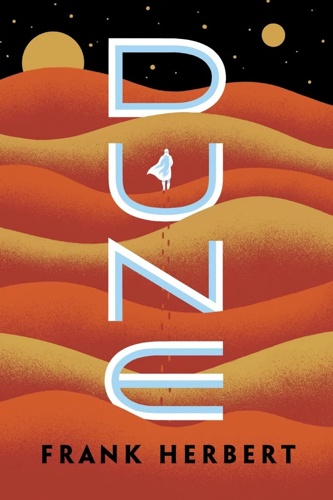
Dune was pretty far down my queue until the movie dropped and suddenly my friends were sprinkling “Lisan al-Gaib” into casual conversation (not kidding). What I found was part political allegory, part oil politics in space, and part psychedelic trip laced with paranoia about machines displacing people. Arrakis is an obvious stand-in for the Middle East: the spice is oil, the Fremen are caught between resource exploitation and self-determination, and the holy war that’s actually a fight over resources is as on-the-nose as it gets. The drug-fueled mysticism that must have felt provocative during the Summer of Love is now a time capsule.
The world-building is oddly tethered to Earth. Choosing Paul and Jessica as the protagonists’ names and having the Bene Gesserit quoting St. Augustine makes the setting feel strangely bifurcated: clearly descended from our history, yet far removed from it—enough that I kept wondering where the break occurred.
Herbert’s imagination is undeniable, but the prose drags. Whole stretches offer nothing but foreshadowing, with momentum stalling out. The book’s endurance feels less about flawless storytelling and more about literary path dependence—it was groundbreaking at the time and made the canon, so it stays there. I respect the imagination, but I wish Herbert had a harsher editor. In the end, Dune survives because it’s big, weird, and conceptually audacious, an artifact of ambition more than perfection.
Zionism and the Fin De Siècle - Michael Stanislawski
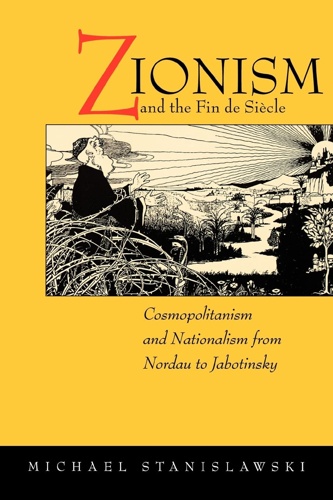
Michael Stanislawski’s Zionism and the Fin de Siècle examines the leaders of modern Zionism and the world that produced them. Not an origin myth nor tidy nationalist genealogy, but a study of political misfits caught between decaying empires and religion on one side and European nationalisms on the other. The result is a portrait not of a single doctrine but a collision of personal trajectories and cultural sensibilities. I picked it up to deepen my understanding of ideas I’ve believed in for a long time, and to ground my responses to the post-10/7 settler-colonial framing.
The book focuses on Herzl, Nordau, Jabotinsky, and Lilien, urban, secular, culturally European men shaped by Vienna, Paris, Odessa, and Berlin, not the shtetl where most Jews lived. The first three worked as foreign correspondents. Lilien was an artist who turned their arguments into images. All confronted a cosmopolitan Europe narrowing into exclusivist nations. Each had set religion aside and saw themselves as cultured citizens of the world, yet they could not ignore that acceptance by their host societies had never been total.
Herzl appears less prophet than pragmatist: he cared little where a Judenstaat arose so long as it enabled a modern Jewish home; Zionism, for him, wasn’t a retreat from cosmopolitanism but its solution. Max Nordau inverted the reigning hierarchy, arguing that the ghetto had been “a refuge,” with a communal wholeness that the fragmented identities of the emancipated lacked. Jabotinsky went further. If Europe excluded Jews, only unapologetic Jewish sovereignty, grounded in power, self-defense, and political realism, could secure Jewish life.
The narrative ends way before the state of Israel is born, but locates its seeds in these people who fit nowhere and who refused the roles on offer. Their conclusion is hard and plain: Jewish life in Europe had become untenable, and Zionism followed. It was self-preservation against an identity politics that denied their identity, much like today’s intersectional ideologies do not see all intersections as valid.
Alexander Hamilton - Ron Chernow
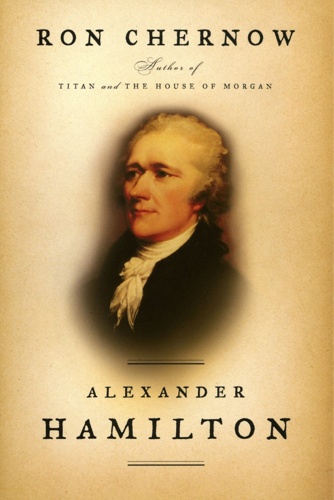
Before picking up Alexander Hamilton, I knew almost nothing about him. Honestly, I’m pretty ignorant of most of US history. As an immigrant, I was drawn to the way Chernow frames Hamilton as a cultural outsider who relied on his skill to vault himself into the center of the country’s founding. The intellectual side of his life is what hooked me most. I went in expecting the banking sections to be a highlight, and while I wish Chernow had gone into even more detail, I understand why he kept it short. Watching him design the financial framework of the US when people were against credit for what they saw as immoral speculation felt like reading the origin story of the modern economy.
I saw the musical in New York not long after finishing the book. I am generally allergic to musical theater, but the casting and Puerto Rican influence felt authentic rather than performatively diverse like so many 2025 productions. It also underscored how New York itself is almost a second protagonist in Hamilton’s story. The city shaped him, gave him his stage, and became the testing ground for his ideas. That blend of outsider grit, intellectual firepower, and urban ambition makes his story feel current and sharp-edged in today’s immigration debate.
The Education of Cyrus - Xenophon (translated by Wayne Ambler)
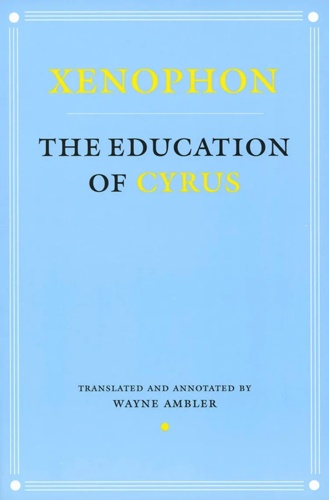
I went to Xenophon’s The Education of Cyrus looking for ancient ideas about good leadership. What I found in this Catherine Project course was less a biography than a fictionalized, almost hagiographic portrait of Cyrus the Great. Half-Persian, half-Mede, Xenophon’s Cyrus draws strength from his multicultural upbringing, which taught him to work across cultures and lead with both discipline and tact.
What’s surprising is how modern it feels. The book opens with a deceptively simple question: why do some leaders inspire willing obedience while others provoke rebellions? Xenophon’s answers could come from a management workshop: give clear orders to avoid the bystander effect, call people by name to win their trust, design incentives and rituals that make loyalty second nature. You can also spot economic specialization, win-win bargaining, even loss aversion here, centuries before we had the names for them.
However, it is not “history” in the strict sense. It is political philosophy in disguise, a thought experiment about the ideal ruler. That fictional frame tries to distill leadership into portable lessons. It does not answer why people will follow you when they don’t have to, but provides observations of human nature that ring true today.
The Verge - Patrick Wyman
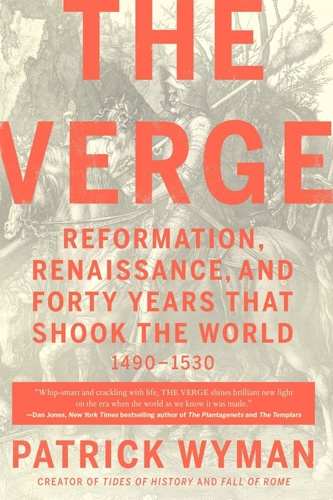
Patrick Wyman’s The Verge drops you into late 15th and early 16th century Europe, a forty-year stretch when politics, commerce, and culture accelerated. It’s history told not through abstract trends but through vivid retelling of lives that embodied the changes setting the stage for the modern world.
One of the book’s memorable stops is early capitalism seen through the life of John Heritage, an English wool merchant whose entrepreneurial instincts for risk-management made him a quiet architect in the new economy. Reading it made me wish for a similar study of Jewish merchants, with their distinctive networks, credit systems, and cultural contexts. When I asked Wyman if such a book existed, he pointed me toward Goitein’s A Mediterranean Society, which is now in my to-read, though I’m still searching for the Eastern European counterpart.
The financiers and feedback loops between state credit and political ambition show how money and power reinforced each other long before modern finance. Bloody battles redrew borders, empires expanded and fractured, and the printing press served as the internet of its time, reshaping authority, commerce, and the speed of politics. The interplay of capital, media, and statecraft feels startlingly contemporary, sketching the blueprint for our world.
1906 - James Dalessandro
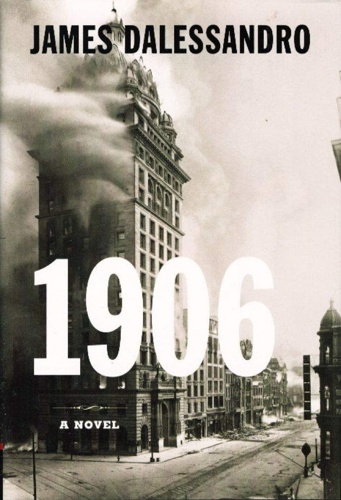
This is a novel set during the 1906 San Francisco earthquake and fire. The novel is nominally about the earthquake and the chaos that ensued, but it’s about political scandal and the contrast between gilded Nob Hill’s opera soirées, and the crime-ridden Barbary Coast. The earthquake is the backdrop.
I listened to the audiobook, and didn’t love it. The details about San Francisco history and the actual historical characters kept me hooked, but the writing is uneven, and I just didn’t care for the romance. The depiction of the contrasts of turn of the century life in SF makes it worthwhile: refined and cultured on the surface, corrupt and dangerous underneath. Not a great novel, but a worthwhile snapshot.
Berlin Alexanderplatz - Alfred Döblin (translated by Michael Hofmann)
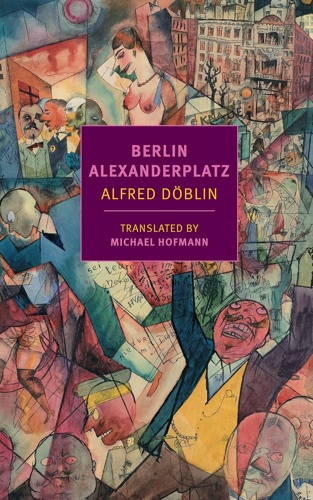
My grandmother heard the same Berlin street sounds that Döblin captured in Berlin Alexanderplatz. She grew up just around the corner, on Kleine Alexanderstraße. I opened Alexanderplatz hoping for a glimpse of her Berlin. I found it—but not in sepia. Döblin’s Berlin is a city in upheaval: neon-lit chaos, noise, and the pressures of modernity slowly clamping down on human life are everywhere, even as new ideas flourish.
It’s not just atmosphere—the background of the news vendors, blaring radios, and construction noise as the U-bahn comes online become a metaphor for the disorienting transformation of urban life in 1920s Germany. Beneath it all runs a criminal undercurrent as communists, hustlers, anarchists, proto-Nazis, and orthodox Jews all jostling for space in a constantly shifting Weimar streetscape. You can see the slow, metallic grind of Nazism moving in from the edge of the page. Döblin’s modernist stream of consciousness captures Berlin not as a single story, but as a fractured mosaic.
At the center is Franz Biberkopf, fresh out of prison and trying to get his life in order, only to be repeatedly pushed off course. His story doesn’t build to redemption, but to resignation. The novel ends with a kind of battered acceptance—cinematic and a little cruel—as Weimar Berlin is rendered as both carnival and slaughterhouse, a place where “The world is iron, there’s nothing you can do, it rolls up to you like a steamroller, there’s nothing you can do.” Franz doesn’t overcome this Berlin; he learns to live with it. The book ends and he doesn’t realize that soon the entire city would be swallowed by a meat grinder even he couldn’t have imagined.
Ready Player One - Ernest Cline
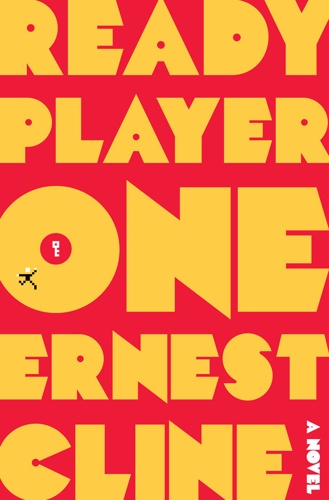
My former manager Amy recommended Ready Player One years ago. It is aimed squarely at Gen Xers and early Millenials, the people who grew up on the first video game consoles and watching ’80s movies. It’s more my brothers’ generation than mine, and I’m pretty sure I missed a lot of the pop culture references scattered in the story. The book is a giant trivia game in search of an Easter egg. I never could have won it.
The poverty in Wade’s world was tough to listen to, but the OASIS felt vivid and fun to imagine. It’s an easy, entertaining read with a bit of a warning about getting lost in online worlds. Watching Wade step out from behind his avatar to meet his friends face to face was interesting, and the spots where the virtual starts to affect the real world were the best parts. The ending twist nailed the old internet truth: online, no one knows who you are.
Anabasis - Xenophon (translated by Wayne Ambler)
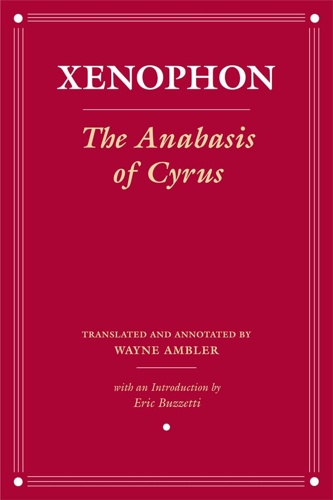
The second leg of my Xenophon class with the Catherine Project, Anabasis, felt like reading a different author from The Education of Cyrus. Confusingly, the books are about different Cyruses, too.
Anabasis is a first-person account of ten thousand Greek mercenaries hired by Cyrus the Younger to overthrow his brother and claim the throne. There is plenty of action, and the ambushes the Greeks face make it a more entertaining but less philosophical read than The Education. They march inland, win on the field, but lose the war when (spoiler!) Cyrus is killed, leaving the Greeks stranded deep in Persia. Soon after that, their top officers are seized in a trap. At that point the Ten Thousand reorganize themselves like a mini-democracy on the move. They convene assemblies, elect new generals, debate strategy, and hold leaders to account while marching. Xenophon — who is both the author and a character in the book — steps up, narrating a retreat rich in survival details, battlefield politics, and self-praise.
What I did not expect was the economics lesson. Ten thousand armed customers do not slip through a city quietly. When they came in peace, markets sprung up on the spot. They paid for grain and animals, and negotiated ferries and guides. Sometimes they still pillaged, and the book does not hide it, but the default tactic was to make trade happen.
It is hard to imagine what that marching republic felt when they finally saw the sea. Honestly, it was a moving bit of writing which made the rest of a dry book worth it.
Pumpkinflowers - Matti Friedman
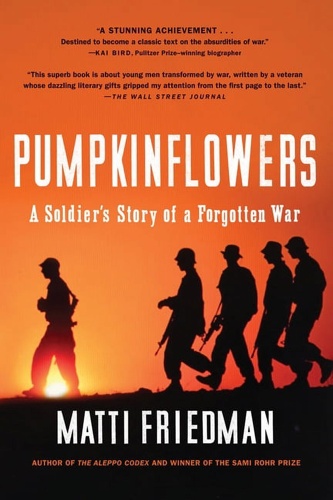
In his own words, this is a book about “Israel and a war in Lebanon, about the ’90s, young people in a scary place, and growing up.” At heart, it’s one soldier at a border outpost, the Pumpkin. I went to the audiobook right after the EconTalk episode, and hearing Friedman read it himself tightens the first-person knots: duty vs. doubt, deterrence vs. escalation, us vs. them.
Language plays a key role. Army radio euphemisms (“flowers” for casualties and “thistles” for helicopters) pair up with pastoral outpost names (Pumpkin, Basil) and create a small garden of distance from violence. It’s how soldiers talk about the unspeakable. The book is a microhistory: one hill, one incident. It’s about bigger patterns of insurgency tactics, media operations, the limits of conventional power, and how stories (the ones you tell and the ones told about you) shape political outcomes.
Then the coda hits: traveling on a Canadian passport, Friedman returns to Lebanon, reaches the ruins of the Pumpkin, and walks the nearby towns, including a restaurant he once watched through a scope. The hospitality is real; so is the open hostility toward Israel and Jews like him. That moral and emotional dissonance is the point: no closure, just a grown-up reckoning with the place that made him.
Stories of Your Life and Others - Ted Chiang
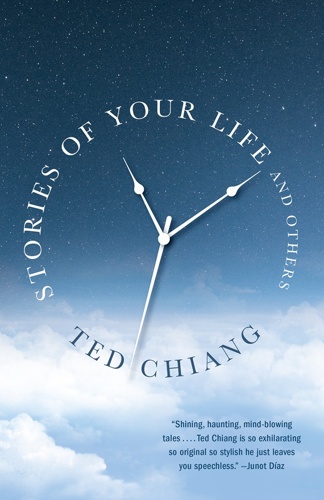
Most people know this book because Arrival was based on one of the stories. That story, Story of Your Life, is excellent, but the rest of the collection is consistently strong, too. Understand had echoes of Severance, while Division by Zero made me think of When We Cease to Understand the World. Both were great. Seventy-Two Letters was another standout, and probably the one that stayed with me most clearly. Dense, eerie, and speculative with its steampunk vibe, it pushes an alternate logic of biology rooted in Jewish concepts and the power of language.
I bought it as a gift for my nephew and got myself a copy, too. It’s sci-fi with an unexpected emotional weight, confronting the limits of human understanding. Each story explores how new knowledge reshapes our consciousness, often at great personal cost. The stories are existential, with reverence for reason, but also a sober awareness of its insufficiency to solve all human dilemmas. Highly recommended.
You can find my lists from previous years here: 2023, 2022, 2021, 2020, 2019, 2018, 2017, and 2016.
Thanks to Hannah Doherty for her feedback on early drafts of this post.
Photo: El Péndulo con Rodolfo, by me. Previously posted in CDMX 2025.